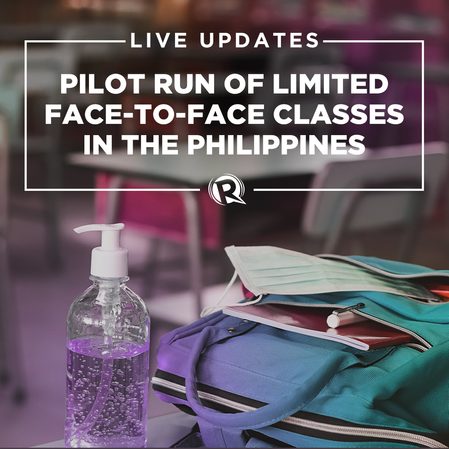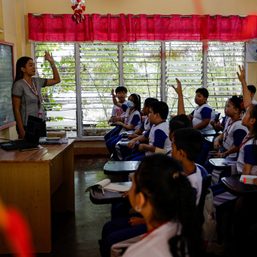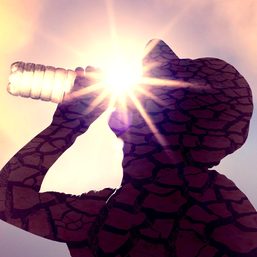SUMMARY
This is AI generated summarization, which may have errors. For context, always refer to the full article.

The Department of Education (DepEd) said it was not requiring students or teachers to wear face shields in the pilot run of face-to-face classes beginning Monday, November 15.
Assistant Secretary Malcolm Garma announced this in an interview with CNN Philippines on Sunday, November 14. However, the participants in the 100 selected schools would still need to strictly wear their face masks.
“Hindi po talaga requirement ang face shield sa loob ng classroom. Pero ‘yung face mask ay talagang importante na mapanatili nating nakasuot sa ating mga mag-aaral sa buong oras ng kanilang ilalagi,” said Garma.
(Face shields are not required in the classroom, but it’s important to keep requiring our students to wear face masks for the entirety of their time in the classroom.)
Face shields have been a pandemic mainstay for Filipinos going out during the pandemic, but health authorities are studying dropping the requirement as COVID-19 cases in the country continue to decrease.
On Tuesday, November 16, a day after the opening of classes, Garma also said that setting up plastic barriers in classrooms was not required.
“Kung may nakalagay, hayaan natin, pero kung wala, hindi na natin in-e-encourage ito (If there are barriers, we will let them be, but if there are none, we no longer encourage these),” Garma said.
Garma said the Department of Education would study if existing barriers affect students’ sight, hearing, or behavior. He also said that these serve as another layer of confidence given to parents to assure them of the students’ safety while in class.
“One day is not enough to see the motivation and behavior of our learners while they’re in the classroom. While we can say they have distance, we’ll observe the children’s movements,” he said.
Garma earlier announced that apart from face shields, another non-requirement for students attending the first COVID-19-era face-to-face classes is COVID-19 testing.
He said the swabbing experience could be “traumatic” for young children. Education Secretary Leonor Briones agreed, saying the trauma could stay with them for “some time.”
Instead, the DepEd will rely on symptom observation. Once a student begins exhibiting symptoms of COVID-19 at school, they will implement the usual protocols like isolation, treatment, and contact tracing.
The department is also not requiring students’ COVID-19 vaccination for now, as the Philippines recently began vaccination for minors, but only for those aged 12 to 17. (Editor’s Note: An earlier version of this story reported that teachers’ vaccination is not a requirement. DepEd backpedaled on this decision and now requires teaching and non-teaching personnel to be fully vaccinated.)
In other countries, where face-to-face classes have already resumed, unvaccinated teachers were able to pass on the virus to students.

The Philippines is the last country in the world to open face-to-face classes since the World Health Organization declared a pandemic in March 2020. On October 25, Venezuela reopened schools after a long closure. – Rappler.com
Add a comment
How does this make you feel?



![[Time Trowel] Evolution and the sneakiness of COVID](https://www.rappler.com/tachyon/2024/02/tl-evolution-covid.jpg?resize=257%2C257&crop=455px%2C0px%2C1080px%2C1080px)


![[The Slingshot] Red zipper on the mouth of Sara Duterte](https://www.rappler.com/tachyon/2024/04/TL-red-zipper-sara-duterte-april-12-2024.jpg?resize=257%2C257&crop=335px%2C0px%2C720px%2C720px)

![[OPINION] How about setting up a heat health warning system in PH schools?](https://www.rappler.com/tachyon/2024/04/heat-health-warning-system-in-PH-schools.jpg?resize=257%2C257&crop_strategy=attention)

![[ANALYSIS] The multiplier effect of negligence in education](https://www.rappler.com/tachyon/2024/04/The-multiplier-effect-of-negligence-in-education.jpg?resize=257%2C257&crop=277px%2C0px%2C720px%2C720px)
There are no comments yet. Add your comment to start the conversation.